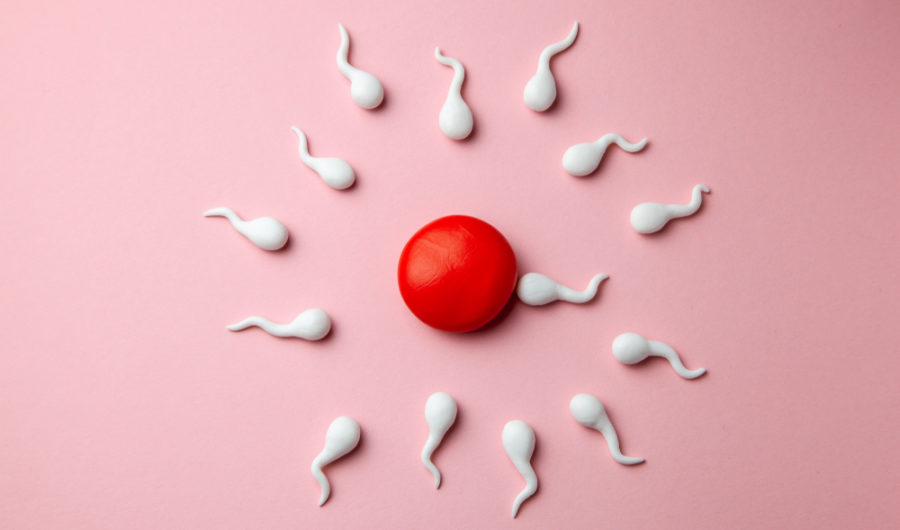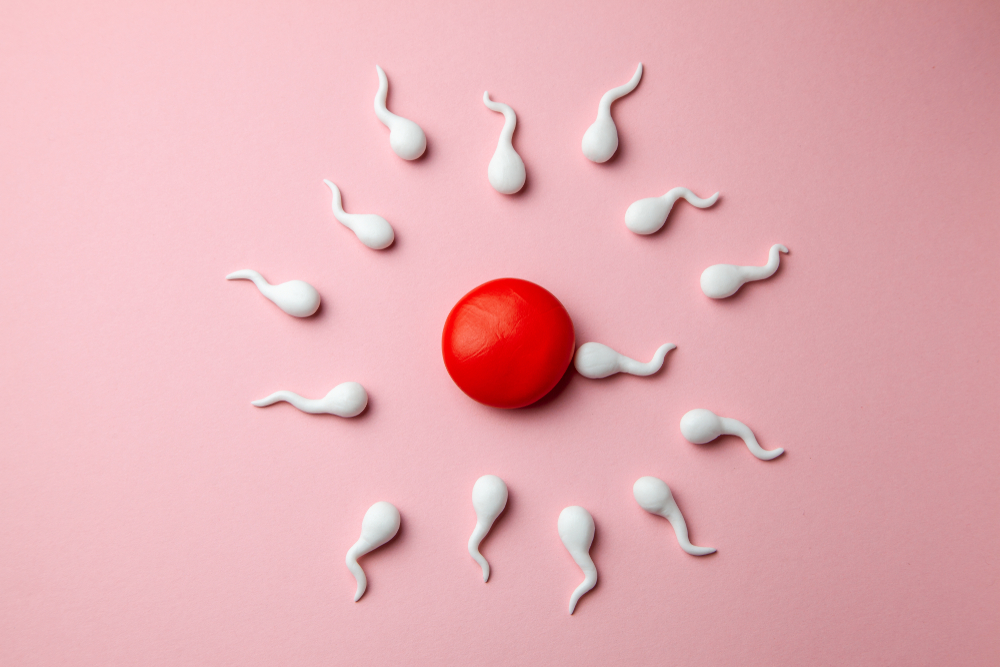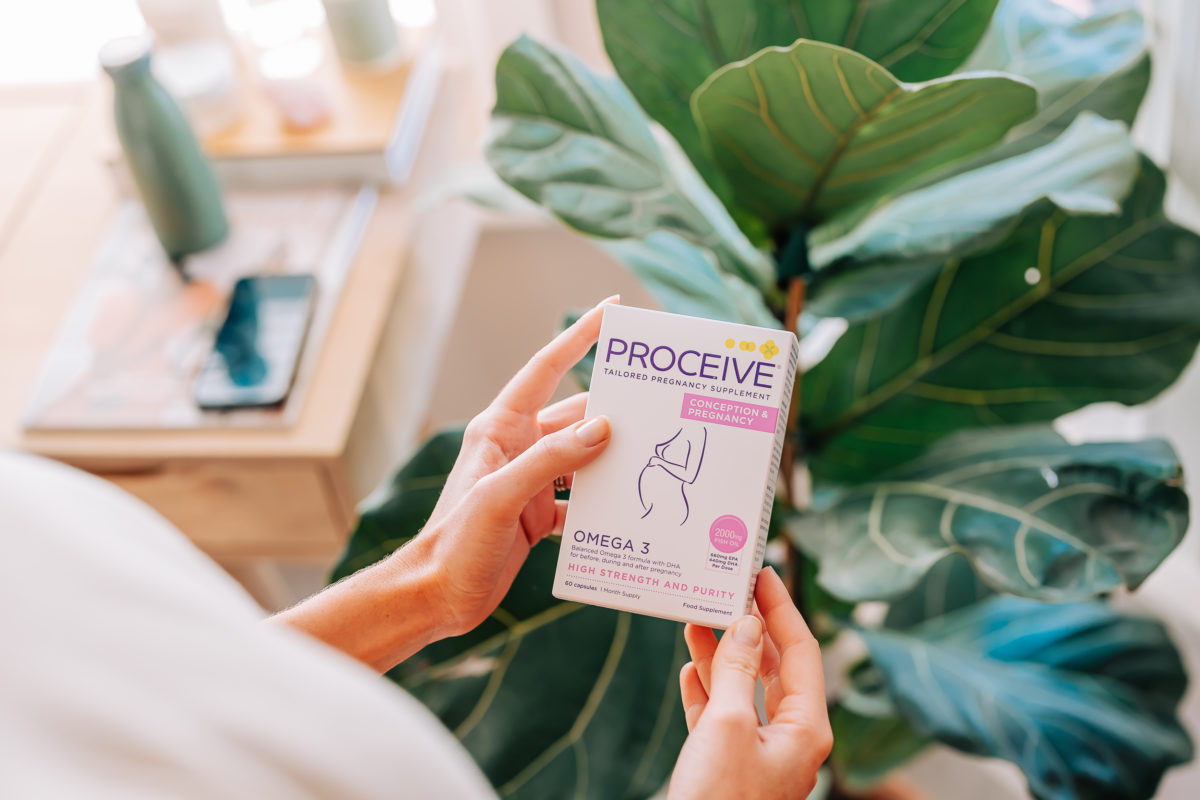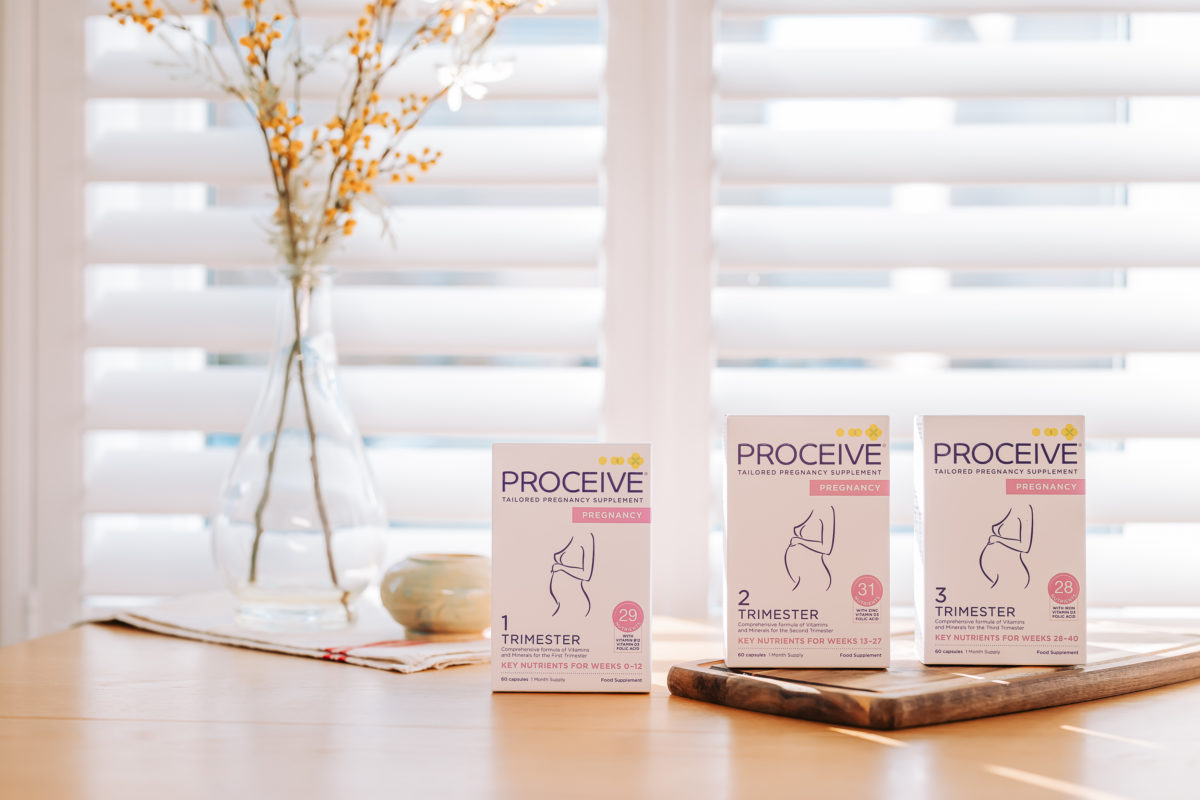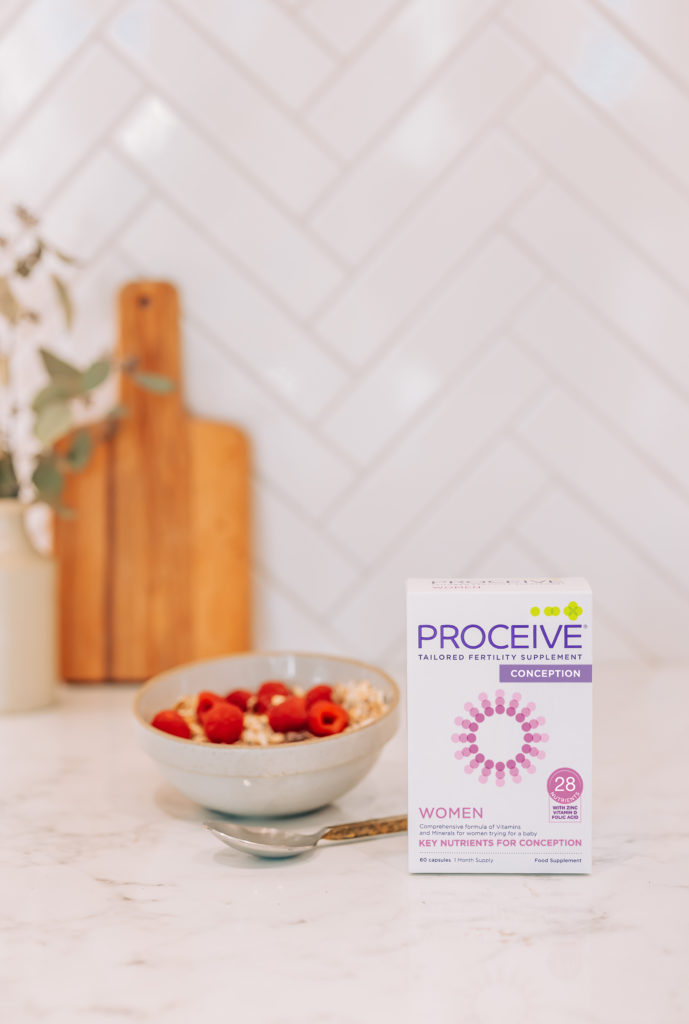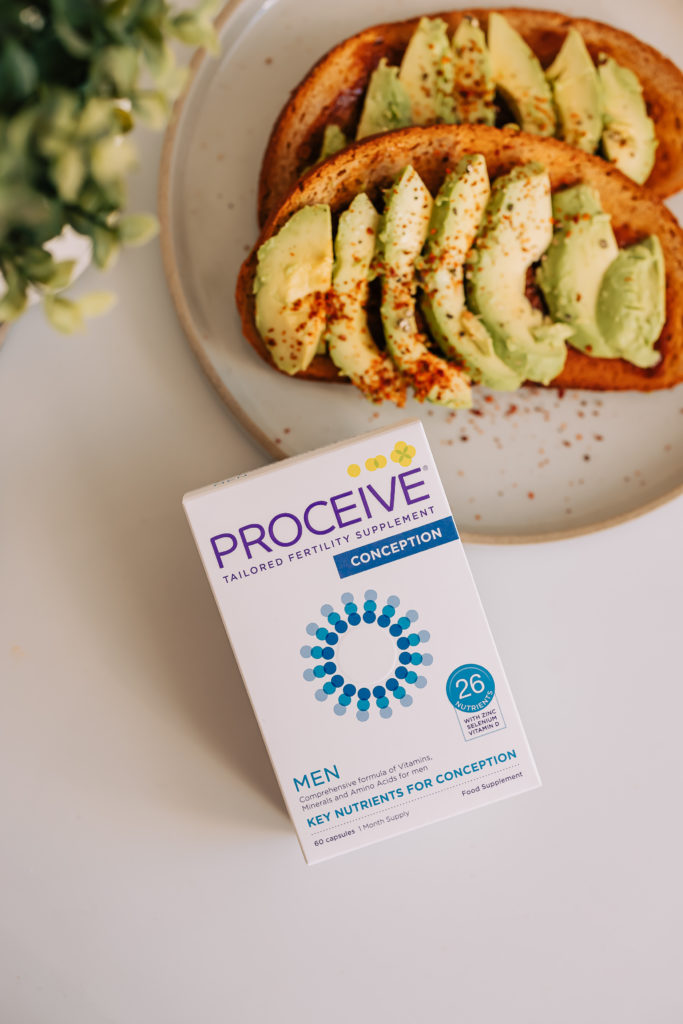You asked the questions, we took them to the experts! To continue the important discussion on the topic of fertility (an often sensitive subject for many), we’ve teamed up with the fertility supplement specialists at Proceive to help anyone who is thinking about getting pregnant and are a bit confused as to where to start. From advice on cycle health and egg quality, to fertility basics like supplements and how to pin-point the all important fertile window, we hope we’ve covered the most asked fertility questions below!
“Is it true that I can only get pregnant a few days a month?”
Many people believe that ovulation is the only time you can get pregnant, but this isn’t true. Yes, the egg you release can only be fertilised 12 to 24 hours after it is released but, sperm can live in your body for up to 5 days. This means that if you have sex in the days leading up to ovulation, you may still become pregnant. Having sex every 1-2 days around the ‘fertile window’ is important but sex at least every 5 days throughout a woman’s cycle can increase her chances of becoming pregnant as abstinence can affect sperm count.
A woman who wishes to become pregnant should get to know her body, specifically her menstrual cycle. Tracking her period cycle means that a woman can better predict when she might be ovulating, which is the time when her ovaries release an egg every month. You can use the Proceive ovulation calculator here.
“I’ve just found out that I’m pregnant – what’s the most important thing to do in the early days?”
Begin by taking Proceive Pregnancy Trimester 1 supplement which is specifically tailored to the nutritional needs of this trimester and contains the recommended 400ug of folic acid in the L-Methyfolate form for improved absorption. Ticking your nutritional box every day will put your mind at ease and allow more time for planning and organising.
If you are feeling nauseous in the early stages of Trimester 1, we recommend eating ‘little and often’ if you cannot manage big meals at this time.
Make sure you’re staying hydrated and drinking enough water to prevent constipation which can begin in early pregnancy.
We recommend taking an Omega 3 supplement which contributes to the development of the baby’s eyesight, brain and heart. Proceive Omega 3 contains 660mg EPA and 440mg DHA.
When you’re pregnant we recommend avoiding excess caffeine, blue cheeses, and soft cheeses with white coatings on the outside such as brie, unpasteurised milk and several types of fish with high mercury contents. We also recommend avoiding foods high in Vitamin A such as liver.
Lastly – rest! Get as much rest as you can and take it easy.
“How long should I take to prepare my body to fall pregnant?”
Pre-conception health for both men and women is so important. Improving nutrition and lifestyle for as little as three months before trying to conceive can make a noticeable difference to both genders as both the male and female reproductive systems need adequate nutritional support to contribute to sperm and egg quality.
We recommend taking Proceive for 3 months before trying, this gives time for the nutrients to build up in your system providing the most benefit. Proceive contains the recommended 400ug of folic acid in the L-Methylfolate form for improved absorption, so you do not need to take this separately which is handy.
For your partner, sperm has a 3-month lifecycle, so any changes made now to diet and lifestyle will impact sperm in 3 months’ time, so it’s great for both partners to take the 3 months beforehand to prepare.
“Is exercise good for fertility?”
Exercise is one of the most important positive behaviours that we can engage in to maintain a healthy lifestyle. It keeps the mind and body healthy and improves overall condition. Maintaining a healthy body weight is so important when trying to conceive. For women exercise improves blood flow to the uterus and ovaries, and generally improves mood. Just be mindful that over exercising can affect your fertility.
“What can I do to increase my chances of getting pregnant?”
Get to know your body: A woman who wishes to become pregnant should get to know her body, specifically her menstrual cycle. Tracking her period cycle means that a woman can better predict when she might be ovulating.
Enjoy a healthier lifestyle: Stop or reduce your alcohol intake. Stop smoking, it is a well-known fact that smoking can have a significant effect on the fertility of both men and women. Eat a well-balanced diet full of fresh fruit, vegetables, wholegrains, pulses, lean meats and fish will give your body the nutrition it needs. Exercising is so important for overall health.
Take a pre-conception supplement: Proceive® Conception is a specially formulated range of fertility & preconception nutritional supplements for men and women. Proceive has been developed by fertility experts using ingredients with clinical science supporting its impact on fertility parameters. Proceive® provides the most comprehensive ingredients including Vitamins, Minerals, Amino Acids, CO-Q10, Omega 3 DHA and also contains 400ug folic acid in the L-Methylfolate format for improved absorption.
Maintain a healthy weight: A woman’s menstrual cycle is dependent on finely tuned hormonal balances. Overweight and obese women have higher levels of the hormone, leptin, which is produced in the fatty tissue. Leptin can disrupt a woman’s hormone balance. Being underweight can also disrupt hormone levels. It is therefore important to maintain a healthy weight for your build and height.
Getting enough sleep: Sleep is one of the lifestyle factors that can directly impact your chances of conception, it goes without saying that you should try to ensure you’re getting enough sleep every night. When paired with a healthy diet and lifestyle as well as the right nutritional supplements, getting enough sleep really may be able to make a difference to fertility.
“What can my partner do to up our chances of getting pregnant?”
Men have to produce between 40 and 300 million sperm cells to be fertile. This is an intensive process and the energy involved in creating these cells is significant. The good news is as new sperm is created every approx.74 days, positive dietary changes and supplementation can improve sperm quality and quantity very quickly. Proceive Men is designed to meet the nutritional demands of the male reproductive system. Getting the environment right and developing good quality sperm cells are a key factor when trying for a baby. A deficiency in any nutrient may have an impact on male fertility.
“Should I avoid high-intensity exercise when trying to get pregnant?”
Exercising is a positive lifestyle behaviour which is great for de-stressing when it is not taxing on the body. Strenuous physical activity invokes a variety of different stress responses in the body. One of these is the inflammatory response. We recommend adjusting your fitness routine, such as reducing the number of days per week you exercise, as well as the hours per day, avoiding overexertion and switching to lower-intensity activities that don’t induce inflammation in the body, such as walking, Tai Chi, Pilates and yoga. These activities have been shown to be effective for easing stress levels and promoting weight loss. Create your own routine, doing what works for you. Click here for more information on fitness and fertility.
“Are there any foods I can eat to help me fall pregnant?”
While there isn’t a miracle list of foods that promise a positive pregnancy test, certain nutrients play an important role in the reproductive system. For women they support the development of the egg, womb and the hormonal system. While for men they support the development of good quality sperm cells.
Of course, we also recommend eating a good amount of protein (preferably with every meal) and focus on eating a diverse range of proteins such as eggs, beans, lentils and good quality fish and lean meat. Of course, we also reccomend to eat all things green so, again, trying to get as many nutrients on your plate at each meal is the goal.
“If I haven’t been too healthy over the past month, will my egg be less healthy too?”
Egg quality is hugely dependent on the environment that they are surrounded in. Eating a healthy, balanced diet in conjunction with adopting positive lifestyle behaviours is the only known way to increase your chances of producing a healthy egg. Micronutrients all help in the egg’s development. This is where Proceive may help by providing the extra support needed to support good pre-conception health.
“My periods are irregular, will this affect my chances of falling pregnant?”
Generally speaking, this does not affect your chances, however we recommend tracking your ovulation days. Ovulation is controlled by hormones produced by the body, and each cycle is different from the last and the next. The rhythm of the female cycle is incredibly delicate – it can be affected by so many environmental factors, such as lack of sleep and stress, that can upset the balance, and both stop ovulation and menstruation or prolong a period.
“Does stress affect fertility?”
Yes, negative lifestyle choices have a harmful effect on the immune function. Prolonged exposure to stress exacerbates the immune system which in turn can disrupt the delicate female and male hormonal orchestra. The growing demands of a modern lifestyle are having a significant impact on our nutritional health. Stress, anxiety, lack of sleep, dieting and poor nutrition all impact the body’s ability to absorb the nutrition needed to optimise reproductive health.
“What supplements/vitamins are best to take for fertility?”
Nutrients are best obtained from a balanced organic diet; however many of us find it hard to eat this way all of the time. Due to the importance of some nutrients and the difficulty obtaining them; we recommend a comprehensive vitamin and mineral supplement, like Proceive, to make sure that mums and dads-to-be are getting all they need for a healthy conception and pregnancy.
Women should make sure that they take a supplement that includes B Vitamins and magnesium as well as folic acid. Proceive contains 400ug of folic acid in the L-Methylfolate form for increased absorption. Folate contributes to the normal maternal tissue growth during pregnancy.
Omega 3 fatty acids are so important for both conception and pregnancy. Omega 3 contributes to the development of the baby’s eye, brain and heart. If you do not eat oily fish, we recommend taking Proceive Omega 3 which is high strength and contains 660mg EPA and 440mg DHA.
For men, selenium supports the production of sperm.
“How long should we try to fall pregnant before seeking help?”
While you should always consider your own personal circumstances, the general thinking is that if you are under the age of 35 with regular cycles, give yourself a year of trying before seeking help. If, however you are over the age of 35 or under the age of 35 with irregular cycles the advice is to see your doctor if you have not become pregnant after six months of trying.
Proceive have tailored their products based on the different needs of their customers. For couples over the age of 35 (For Women) and 40 (For Men), or who have been trying to conceive for a year or more we recommend taking Proceive Max. This product contains more nutrients (33 vs 28) at a much higher level than their capsules. The clinical research has shown that those that have been trying for a little while benefit from the higher strength formula and the extra ingredients.
“Is acupuncture or reflexology beneficial for fertility?”
If you find that they reduce your stress levels than it is beneficial.
For more information visit Proceive.com

